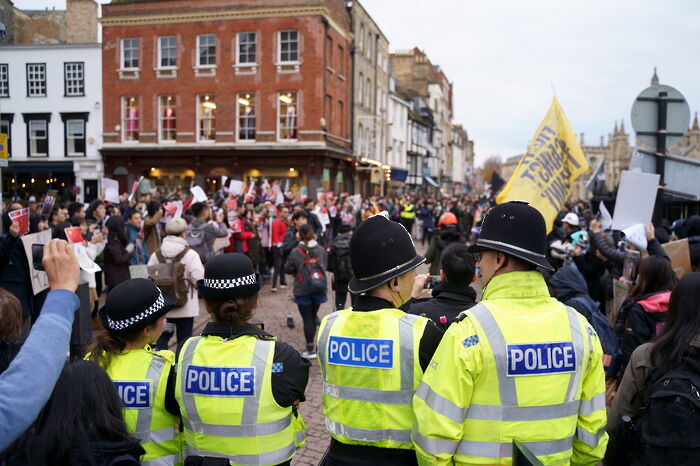We should tell it like it is: A Black student was dragged by his ankle at the Oxford Union
Amin Ebrahimi-Afrouzi argues that we should consider the intersectional quality of Azamati’s treatment, and that the media should not disregard his blackness

Last month, Ebenzer Azamati, a black student at Oxford University, was violently pulled away from his seat and dragged by his ankle by a security guard at an event at the Oxford Union, a debate society for paying student members.
The mainstream media outlets that recently covered this inhumane treatment and its aftermath missed the mark with headlines such as: “Blind man ‘dragged out’ of Oxford Union debate” or “Blind student dragged out of Oxford debate ‘by his ankles’” and “Outrage as blind African student is dragged by ankles out of Oxford Union debate.”
Azamati, who is studying International Relations at St John’s College, Oxford, is an international student and blind, which makes how he was treated particularly egregious. The outrageousness of the incident is centrally about dragging a Black student out of an event. The incident was outrageous because – it is reasonable to infer – it was racist.
“Despite evident and inferable racism, none of the articles cared to directly address race or the potential racist implications of the incident.”
Azamati had arrived at the event early to reserve a seat, but when he returned to reclaim his seat, he was refused entry, being told that the debate chamber was full and the debate was about to begin. After sitting down in a seat offered by another attendee, a security guard slapped his thigh and tried to pull him from his chair, proceeding to drag him by his ankle. It is reasonable to infer that this incident was racist because a white member would likely not have even been stopped and would certainly not have been dragged by the ankle out of his seat after having sat down.
What ensued after the incident was more overtly racist. The videos of the incident show that Azamati was calm and peaceful while holding fast to the seat as he resisted forceful ejection. Yet, following the incident, the Oxford Union brought a complaint (now withdrawn) against Azamati for “violent misconduct”, and, in a hearing, suspended him from the union until May 2020. The charges in the complaint were evidently false. But the problem here is bigger than simple inaccuracy. The charges included a common racist trope that is routinely used to target black men. They alleged that Azamati had behaved violently by thrusting an arm out and using “aggressive hand gestures”.
Despite evident and inferable racism, hardly any articles cared to directly address race or the potential racist implications of the incident. Many of the articles, including the ones in The Guardian, the BBC, and CNN failed to even mention that Azamati is Black.
“The news articles not only cover up the sustained racism of the incident, but they divert attention from it by emphasizing exclusively other aspects of Azamati’s identity.”
Media coverage of this incident should inquire into whether Azamati was so treated due to his race at the event. It must make clear that the responses of the Oxford Union and its president were racist and emphasize the unjustness of the disciplinary committee’s finding that called Azamati guilty (although the charges were later dropped and his membership reinstated).
The coverage should also make clear that the ensuing public outcry stems from the refusal to watch yet another innocent black male be vilified and penalized by his attackers after becoming a victim of their racism; and the refusal to see this racist establishment not held accountable yet again.
This outrage fuelled a protest last Friday, demanding that the Union president resign; and it moved tens of thousands of people to sign an online petition, which the Oxford University Africa Society (OUAS) started in support of Azamati.
The press must make these matters explicit because we can only hold perpetrators like the Union and its president accountable if we confront them directly about their racism. Azamati was likely first a victim of the security staff’s racism, then of the Union’s president’s racism (who started unfounded disciplinary proceedings against him), and subsequently of the institution’s racism, which found him guilty.
The news articles not only cover up the sustained racism of the incident, but they divert attention from it by emphasizing exclusively other aspects of Azamati’s identity.
Of course, discrimination against international students and disabled individuals is also rampant; being blind and an international student may certainly have played a role in the discriminatory and inhumane treatment that Azamati received. Moreover, the fact that Azamati is blind likely added to the trauma he suffered. Finally, the Union staff fell far short of the respect they owed to Azamati, if we measure their conduct with the presumption that they owe blind participants a higher standard of accommodation.
All of these facts are relevant to the story. But media coverage should not detract from – or worse, replace – the coverage of Azamati’s race and the racist treatment he received. Nor should “blind” take the place of “Black” in the headlines – leaving out the victim’s race leaves out the racism in the incident.
On these fronts, therefore, the news articles’ failure to explicitly inquire into and address race doubly disappoints: first, by denying Azamati’s intersectional experience as a blind black international student. Second, by diverting attention away from his race through headlines that only emphasize his disability, or in a few cases, his international status as an African student. With that diversion, such articles protect the Oxford Union and its president, deliberately or not.
 Comment / College rivalry should not become college snobbery30 January 2026
Comment / College rivalry should not become college snobbery30 January 2026 Features / Are you more yourself at Cambridge or away from it? 27 January 2026
Features / Are you more yourself at Cambridge or away from it? 27 January 2026 Science / Meet the Cambridge physicist who advocates for the humanities30 January 2026
Science / Meet the Cambridge physicist who advocates for the humanities30 January 2026 News / Downing Bar dodges college takeover31 January 2026
News / Downing Bar dodges college takeover31 January 2026 News / Vigil held for tenth anniversary of PhD student’s death28 January 2026
News / Vigil held for tenth anniversary of PhD student’s death28 January 2026









